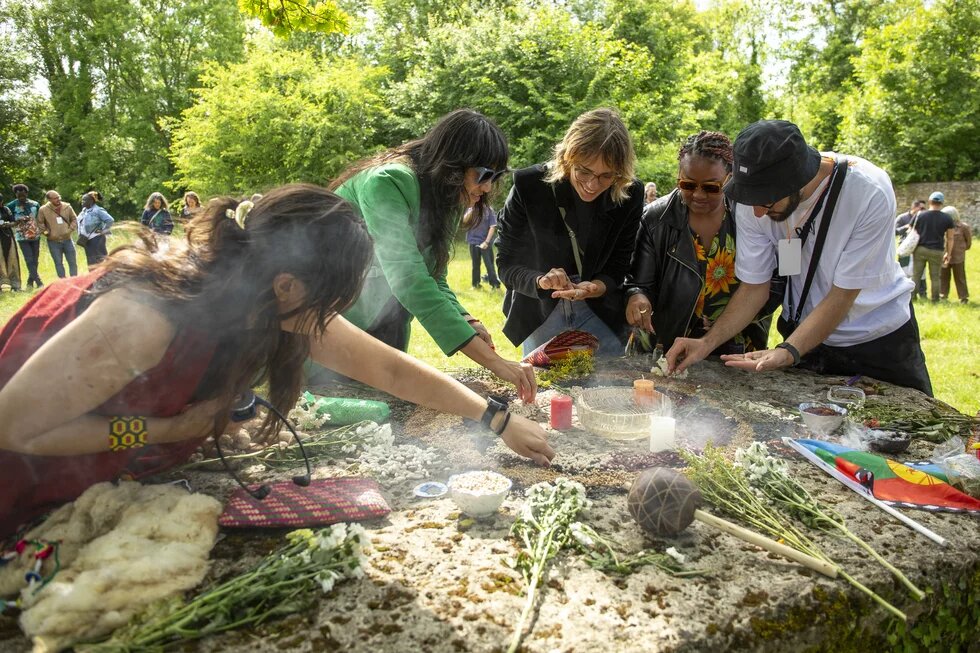Do you think the end of the world is near? What if I told you that some worlds have already ended, while others continue to quietly crumble? Collapse is already a reality in many territories, pushed to the brink by wars, extreme inequality, and environmental destruction. Faced with this systemic crisis—and also a crisis of narratives—solutions won't come solely from above. It's through the strength of communities that alternative paths emerge. To illuminate these initiatives, the Heinrich Böll Foundation is launching an interactive map with sustainable solutions from over 30 countries, reinforcing its commitment to building bridges and cultivating possible futures.

Multiple Ends, Disputing Narratives
For Indigenous peoples, for example, the end of the world doesn't come in the form of a tsunami—it arrives in the form of land plunder, military and imperialist violence, and neo-extractivism. Therefore, the ends of the world are multiple. Unfortunately, this is not a story restricted to the colonial period or to the national context. What we see today is an update of these practices, adapted to the new scenario. Just look at the race for rare minerals in African countries, the mega-energy projects in Indigenous territories, or neocolonialism disguised as humanitarian aid: new forms of an old script, in which a few profit while many lose.
In this context, it's important to understand that the climate emergency is also characterized by a narrative crisis. Since the beginning of the destruction of the Amazon, deforestation has been financed with public money and packaged under a rhetoric of progress: "integrate to avoid surrender." The dictatorship financed the devastation and further shaped the national imagination to justify everything in the name of development. Today, those maintaining this structure are agribusiness and the ruralist caucus, which continue to sell the forest as an asset on the market.
On the global stage, billionaires fulfill a similar role: they colonize the imagination with promises of innovation, artificial intelligence, and escape to Mars, while multiplying their profits at the expense of entire territories. This dominant, highly funded narrative is always the first to circulate, the most heard, the most replicated. Meanwhile, dissenting voices—those that denounce, propose other ways of life, and re-enchant the world—almost never find a place. But they exist. And they are speaking out.
Voices that resist and build futures
Davi Kopenawa's actions, for example, were decisive in the demarcation of the Yanomami Indigenous Territory—the largest ever registered in the world. What did he do? He told his story. He took a narrative unknown to the world outside Brazil. A profoundly ecological approach that understands human existence in direct connection with territory, spirits, and animals. He recounted how his people were being decimated, dying from gunshots, hunger, and malaria, due to the encroachment of mining on their lands. Like him, other decolonial voices have brought about transformations and contributed to postponing the end of the world.
Along the same lines, organizations and social movements have also played a central role in this postponement. Peripheral territories, pushed to collapse by a dominant minority, have been reacting with sustainable alternatives—or what the Heinrich Böll Foundation calls "positive futures." Spread across the globe, there are hundreds of community initiatives that invest in social innovation, collective intelligence, and the power of traditional knowledge to design more just, sustainable, and diverse futures. But despite responding to global challenges, these initiatives still face erasure—they are rarely heard, rarely seen, and rarely reach decision-making forums
Among the many initiatives facing challenges in achieving visibility is Banlieues Climat, a French association that works in urban peripheries—the so-called banlieues—to place these territories at the center of climate action. Created in 2023, the organization responds to a reality of environmental injustice: in these regions, where the majority of immigrants or children of immigrants live, the impacts of the climate crisis are exacerbated by precarious infrastructure, extreme heat, and pollution. Despite its strong involvement in environmental education, political training, and community engagement, Banlieues Climat still faces difficulties in reaching global decision-making spaces. It is precisely to strengthen experiences like this—which resist, innovate, and propose transformative paths from the margins—that the Positive Futures project was born.
Positive Futures: Bridges to Transformation
The Heinrich Böll Foundation created the Positive Futures project to strengthen these local voices who, from their own territories, build alternative paths. The goal is to connect these people, give visibility to their solutions, and show that there are other ways of existing—rooted in community knowledge, citizen science, and organizations that face socio-environmental challenges on the front lines. Because it is from the micro that the most powerful responses to the planet's dilemmas emerge—and not the other way around. As part of this effort, an interactive map will be launched on August 7th, bringing together transformative experiences from more than 30 countries, so that these possible futures cease to be invisible and inspire concrete change.
More than just a collection of experiences, the project aims to contribute to a global network of social transformation. Because futures are built collectively—and civil society plays a decisive role in this process. Therefore, the Heinrich Böll Foundation acts as a convener: listening, connecting, and fostering voices that, even in different contexts, share the same commitment—to reject the end as destiny and imagine new forms of existence

